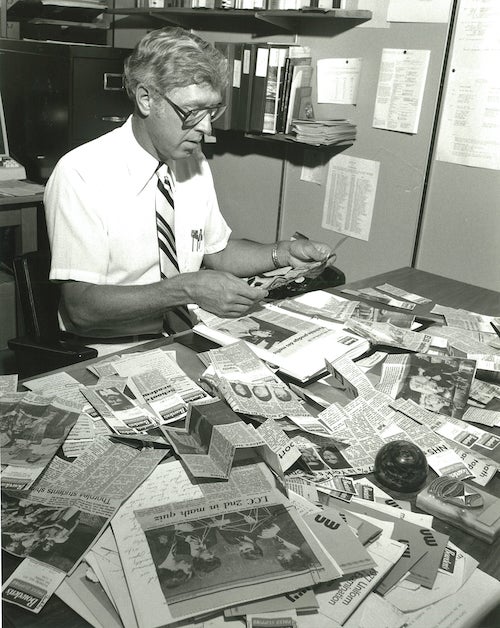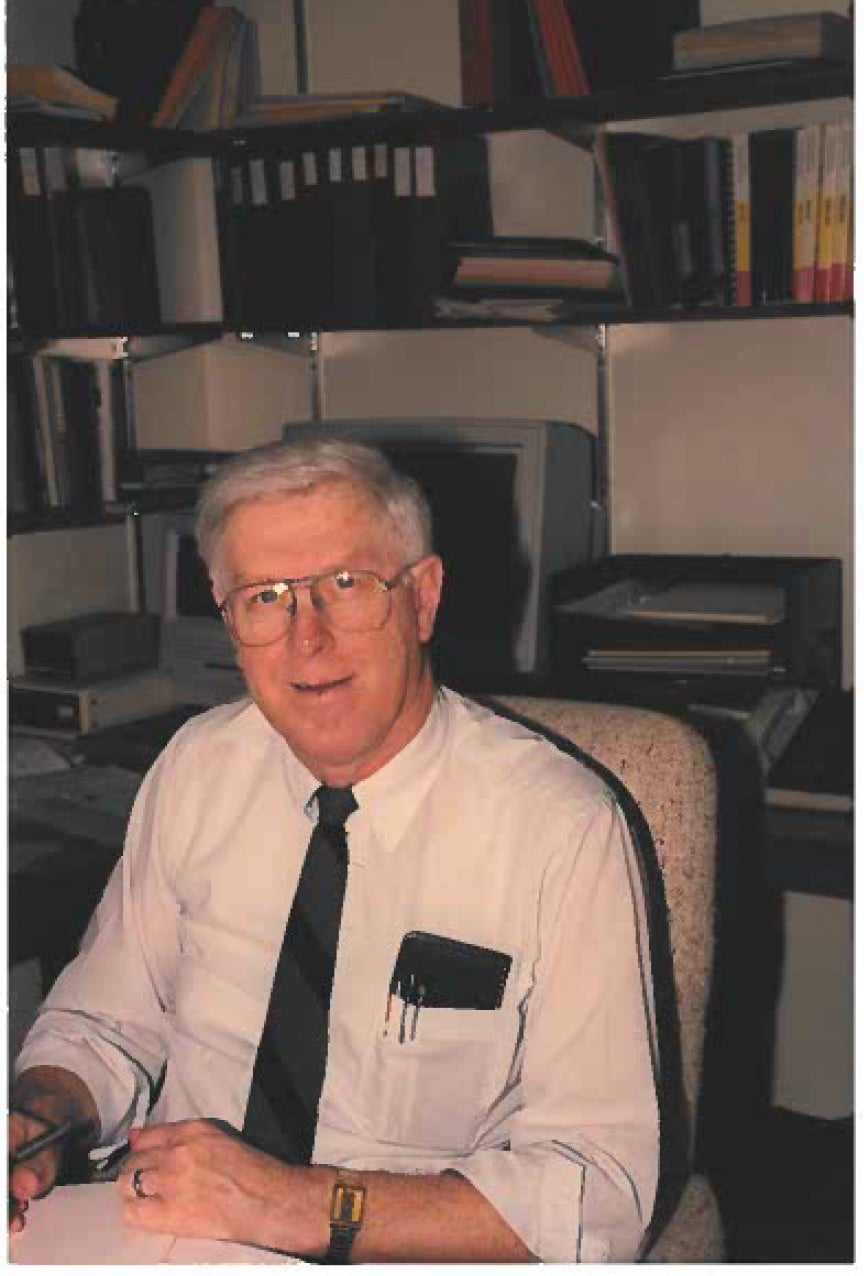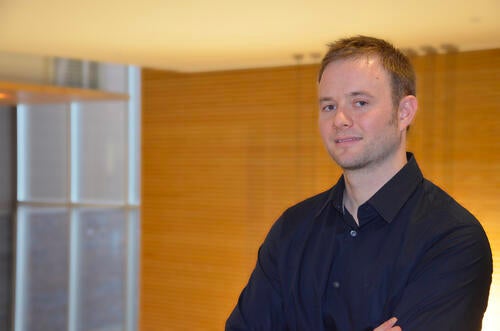Editor:
Brandon Sweet
University Communications
bulletin@uwaterloo.ca
Remembering Professor Ron Dunkley

By Lata Punetha. This article was originally published on the Centre for Education in Mathematics and Computing website.

It is with heavy hearts that we bid farewell to a true visionary and leader, Ronald (Ron) Garth Dunkley, long time faculty member in the Faculty of Mathematics at the University of Waterloo, the founding director of the Centre for Education in Mathematics and Computing (CEMC), and the co-creator of the Canadian Mathematics Competition. Ron passed away on February 19, 2023, after a brief illness. In this tribute, we celebrate Ron’s life, honour his legacy, and remember him for the many ways in which he enriched our lives and the lives of countless others.
Ron began his career as a high school mathematics teacher at Kingsville D.H.S and later at St. Mary’s D.C.V.S. where he was department head. The idea which led to the ultimate creation of the CEMC was born at a professional development workshop for high school mathematics teachers in 1962. Four high school mathematics teachers were concerned that their students were not prepared for American high school math contests and decided to launch a mathematics contest for high school students in District 10 (where the four of them taught), helping these students improve their mathematical problem-solving abilities. These four educators - Ron Dunkley, Ed Anderson, Don Attridge and Bill Nediger collaborated with Ralph Stanton and Ken Fryer from the University of Waterloo and a few days later, the math contests were born.
Roughly 350 local students attempted the District 10 mathematics contest in the first year. Over the course of six decades, one contest became a dozen contests which reach students in various grades, starting from Grade 7, and the contests moved formally under the University’s umbrella. Today, more than 265 000 students in over 80 countries register for the various contests offered by the CEMC. The contests are not only geared towards students but also facilitate the growth and support of a network of mathematics teachers on a global level, through contest development meetings and marking events. By offering a platform that fosters professional development, these contests allow teachers from different schools to interact and share innovative ideas.
Steve Brown, Professor Emeritus from the Department of Statistics and Actuarial Science and a former Director of the CEMC adds, Ron would say that schools had sports programs for talented athletes that involved students, coaches and practicing for competitions, so why not have something similar for talented math students? Teachers who are invited to sit on committees to prepare the contests view this as valuable professional development. Students who do well on the contests come to the attention of the math faculty at an early age. These contests are one very important reason for the success of the Faculty of Math at Waterloo in attracting some of the best students from across Canada. Ron loved to talk about the young math students that he met through the contests, and how he was amazed at how brilliant they were. He would talk about students from every era of his time at Waterloo with affection and admiration.
After collaborating with the University of Waterloo for the Canadian Mathematics Competitions, Ron's association with the institution grew stronger, and in 1967, he joined the University of Waterloo. He dedicated the better part of his career to the University, gradually climbing up the ranks to become the Associate Dean in the Faculty of Mathematics and the Director of the Centre for Education in Mathematics and Computing when it was founded in 1995. As part of his efforts to promote the university, Ron was a pivotal member of the team that visited schools across the country to identify and recruit young talent. During these visits, he even used his musical talent and played the trumpet to attract students to Waterloo. His enthusiastic efforts influenced many talented students to join Waterloo, significantly contributing to the early development of the Faculty of Mathematics.
As a founder of the World Federation of National Mathematics Competitions, Ron held the prestigious position of its president. He also served as the Deputy Leader of the Canadian Team for the International Math Olympiad in 1986, a role that brought him immense pride. Ron's unwavering dedication to mathematics education earned him several accolades in Canada. In recognition of his instrumental work in developing mathematics contests in Canada, he was appointed a Member of the Order of Canada in 1996. Ron also received numerous other awards, including the Descartes Medal in 1987, the Paul Erdos Award in 1994, and the Adrien Pouliot Award for his significant contributions to Mathematics Education in 1997.
Read the rest of the article on the CEMC website.
The Faculty of Mathematics also posted a tribute to Ron Dunkley, which you can read on the Math website.
Banking crisis echoes 2008 but with 'marked differences'

By Jon Parsons. This article was originally published in Waterloo News.
The recent collapse of banks in the United States and this week’s intervention by the Swiss government to facilitate the takeover of banking giant Credit Suisse might have some worried about a repeat of 2008.
Dr. James R. Thompson, associate professor in the School of Accounting and Finance and co-director of the University of Waterloo’s Computing and Financial Management program, says that while it is not the same type of crisis, some of the results could well turn out to be the same.
“In 2008, some banks got in trouble because of shoddy collateral, like mortgage-backed securities, which at the time no one knew much about and were very opaque,” Thompson says. “Now, the collateral that’s being used for loans tend to be fairly reasonable. More of this collateral in the US are government securities, which are easy to value.”

Dr. James R. Thompson, associate professor in the School of Accounting and Finance and co-director of the University of Waterloo’s Computing and Financial Management program.
But while the underlying conditions are quite different, “it doesn’t really matter,” Thompson continues. “If people decide they’re going to run a bank, the bank is going to get run, and the bank can’t do anything about it without government assistance or another bank taking them over.”
Although Thompson says the system is fundamentally healthier than in 2008, it does not guarantee the financial system will get through the current phase of instability without more bank failures.
First domino
Silicon Valley Bank (SVB), which was among the first to collapse in recent weeks, primarily served tech companies and more specifically venture-finance tech companies. Because of the recent tech downturn, Thompson explains, venture capital funding started to dry up. A natural reaction for such companies when they are not getting as much funding is to start drawing on deposits at their bank.
“What we saw was SVB simply having more of their customers taking money out. That feeds on itself. If everyone knows everyone else is taking their money out, it is easy to think, well, I better get there quickly in case there’s nothing left later.”
Over 90 per cent of the deposits held at SVB were uninsured, since US regulators insure deposits up to $250,000 and many of the bank’s customers had much more than that in accounts. When the bank collapsed, panicked companies and individuals were left wondering if it would mean the end for their businesses. A few days after the collapse the US Federal Deposit Insurance Corporation (FDIC) stepped in and blanket-insured all deposits, overriding the $250,000 limit for SBV depositors.
“Last weekend was a very tight weekend for many tech companies as they didn’t know how they were going to make payroll,” Thompson says. “And the following week, if they didn’t have access to enough of their money in SVB, that would have had serious consequences.”

The Tannery Building in downtown Kitchener is a hub for tech companies in the Waterloo Region. Local tech companies were caught up in the recent collapse of the Silicon Valley Bank.
Canadian companies, including many organizations in the Waterloo tech ecosystem, were also affected by the SVB collapse. “Our exposure in the Waterloo region would have been abnormally high for a Canadian city because of our tech community,” Thompson continues. The Canadian government did the same thing as in the US to guarantee any Canadian deposits held with SVB.”
European contagion
Following the collapse of SVB and a few other US banks, instability in the banking system spread to Europe. In particular, Credit Suisse, among the largest and most important banks in the world, needed to be rescued by a sale to another Swiss bank, facilitated by the Swiss government.
“A failure of one of these banks that are included as a ‘systemically important financial institution’ could be catastrophic,” Thompson says. “They have too many connections to the rest of the financial system globally.”
But Thompson also points out that the issues with Credit Suisse were not altogether surprising, as the bank has in recent years been exposed to the failure of a large hedge fund and “the outflow of deposits from Credit Suisse really started last year.”
“In the last week, the run on the bank has picked up substantially, and they were unfortunately a weak link. It is quite a big deal, because Credit Suisse is such an important part of the global banking system. The results this past weekend was a guarantee from the Swiss Central Bank and their financial regulator, plus a buyout from fellow Swiss bank UBS.”
Protecting your deposits
Asked what Canadians can do considering ongoing instability in the banking system, Thompson provides reassurances that large Canadian banks are generally stable and diversified, and so it is unlikely any Canadian banks would collapse.
Thompson points out that Canadian deposits are insured up to $100,000, and that the safe thing to do is to have multiple accounts at different banks if one exceeds that limit.
“It’s generally something that Canadians don’t think about very often because we think our banking system is so sound. But it makes sense to at least keep yourself protected just on that very small chance that things could go south here in Canada.”
PhD candidate wins award for water simulation tech used in Avatar: The Way of Water

Left to right: Alexey Stomakhin, Douglas McHale, Steve Lesser and Joel Wretborn at the 21st Annual Visual Effects Society Awards. Alexey, Steve and Joel are with WētāDigital x Unity, Douglas is with WētāFX. Photo credit: Unity Technologies.
PhD candidate Joel Wretborn and his colleagues Alexey Stomakhin and Steve Lesser at the New Zealand–based visual effects studio WētāDigital x Unity and Douglas McHale at WētāFX have won an Emerging Technology Award at the 21st annual Visual Effects Society Awards for their water simulation toolset used in Avatar: The Way of Water.
![]()
The Visual Effects Society is the entertainment industry’s professional honorary society representing visual effects practitioners across the globe. Since 2002, the society has held the VES Awards to honour the best work of the previous year in various categories.
Joel Wretborn, who began his doctoral studies under Professor Christopher Batty’s supervision in January, and his colleagues at WētāFX developed a new comprehensive toolset to simulate water realistically, from colossal splashes and cresting waves at the largest of scales to tiny water droplets, thin films and bubbles at the smallest.
As the film’s name suggests, Avatar: The Way of Water features spectacular water scenes, and the visual effects to portray water naturally required development of a variety of solvers running in tandem.
“We knew Avatar would have a lot of challenging scenes, so a Water Task Force was assembled early on with a mix of researchers, developers, and artists,” Joel recounts. “We were given a few characteristic shots, for example a creature creating a huge splash, where we needed to capture both the large- and small-scale details of such a scene. We worked on specific water simulations with the intent to develop tools that could be employed in a variety of simulations. With most movies you have six months or maybe a year to deliver, and when you have such a short timeline research becomes difficult. But the longer lead time we had with Avatar gave us the opportunity to develop high-fidelity effects.”
The water effects team also developed a new tool they call the state machine, which allowed them to transition between solvers at a variety of scales.
“Solvers are usually tailored to create simulations at a certain scale,” Joel said. “You might have a solver that’s particularly adept at creating ocean-sized water simulations and you might have another that’s great at simulating tiny bubbles or thin tendrils of water on a person’s face as they emerge from water. One of the things we developed that was heavily used in Avatar were solvers that could transition between scales — a solver to simulate large, bulky fluids, a solver to simulate water spray or foam, a solver to simulate mist, and so on. Depending on the phase of the water and scale of the scene, we would transition to the most appropriate solver.”
This year is the first that the Visual Effects Society has recognized emerging technology as a category to be acknowledged and celebrated.
“Typically, only the artistic side of a movie is given an award, such as an award for best visual effects,” Joel said. “But this is the first time that VES gave an award to highlight the contributions the technical crew made to support the artists who use the tools to create these amazing scenes. It’s a great honour to be rewarded for creativity in developing the tools and workflows that artists use to create the visual effects in a movie.”
Participants needed for student eating habit study

The Department of Geography and Environmental Management is inviting participants for research in student eating habits and food perceptions.
“We are looking for volunteers to take part in a study of the eating habits of the University of Waterloo's student population. The purpose of this study is to find out where students procure their food, as well as student perceptions on the quality, accessibility, and affordability of their food.”
How to participate: Your participation in this study involves a one-time online anonymous survey which will take approximately 10 minutes of your time. You must be a University of Waterloo student to participate in this study.
For more information about this study, please contact Ben Woodward, Department of Geography and Environmental Management, via e-mail at bwoodwar@uwaterloo.ca.
Students can participate by using this link. This study has been reviewed and received ethics clearance through a University of Waterloo Research Ethics Board.
Link of the day
When and Where to get support
Students can visit the Student Success Office online for supports including academic development, international student resources, immigration consulting, leadership development, exchange and study abroad, and opportunities to get involved.
Instructors looking for targeted support for developing online components for blended learning courses, transitioning remote to fully online courses, revising current online courses, and more please visit Agile Development | Centre for Extended Learning | University of Waterloo (uwaterloo.ca).
Faculty, staff, post-doc and graduate student instructors can find upcoming teaching and learning workshops, self-directed modules and recordings of previous events on Centre for Teaching Excellence Workshops and Events page.
Instructors can access the EdTech Hub to find support on Waterloo’s centrally supported EdTech tools. The Hub is supported by members of IST’s Instructional Technologies and Media Services, Centre for Teaching Excellence, Centre for Extended Learning and subject matter experts from other campus areas.
Supports are available for employees returning to campus. Visit IST’s Hybrid Work and Technology guidelines and workplace protocols to assist with the transition.
Students with permanent, temporary and suspected disabilities and disabling conditions (medical conditions, injuries, or trauma from discrimination, violence, or oppression) can register with AccessAbility Services for academic accommodations (classroom accommodations, testing accommodations, milestone accommodations).
Instructors can visit AccessAbility Services' Faculty and Staff web page for information about the Instructor/Faculty role in the accommodation process. Instructors/Faculty members are legally required to accommodate students with disabilities. AccessAbility Services (AAS) is here to help you understand your obligations, and to offer services and resources to help you facilitate accommodations.
Did you know that the Writing and Communication Centre offers many in-person and virtual services to support you with any writing or communication project? This term we've added The Write Spot: a new student space in South Campus hall, complete with bookable workspaces, drop-ins with our peer tutors, and free coffee and tea. We also have one-to-one appointments with our writing and communication advisors and peer tutors, email tutoring for grads and undergrads, drop-ins at Dana Porter Library, online workshops, writing groups, English conversation practice, and even custom in-class workshops. For any communication project, the Writing and Communication Centre is here to support you.
Research Ethics: Find yourself with an ethical question, unsure if your work requires an ethics review, or need advice about putting together a research ethics application? Reach out to one of our friendly staff by booking a consultation or email us with your questions.
Co-op students can get help finding a job and find supports to successfully work remotely, develop new skills, access wellness and career information, and contact a co-op or career advisor.
The Centre for Career Action (CCA) has services and programs to support undergrads, grad students, postdocs, alumni, and employees in figuring out what they value, what they’re good at, and how to access meaningful work, co-op, volunteer, or graduate/professional school opportunities. Questions about CCA's services? Live chat, call 519-888-4047, or stop by our front desk in the Tatham Centre 8:30 a.m. to 4:30 p.m., Monday to Friday.
Drop-in to in-person Warrior Study Halls on Thursdays from 5:00 p.m. to 6:30 p.m. in DC and DP. Join a Peer Success Coach to set goals and work independently or in groups each week.
Renison's English Language Institute continues to offer virtual events and workshops to help students practice their English language skills.
If you feel overwhelmed or anxious and need to talk to somebody, please contact the University’s Campus Wellness services, either Health Services or Counselling Services. You can also contact the University's Centre for Mental Health Research and Treatment. Good2Talk is a post-secondary student helpline available to all students.
The Library is here to help, both in person and online. Our spaces are open for access to book stacks, study spaces, computers/printers, and the IST Help Desk. For in-depth support, meet one-to-one with Librarians, Special Collections & Archives and Geospatial Centre staff. Visit the Library’s home page to access our online resources for anywhere, anytime learning and research.
The Faculty Association of the University of Waterloo (FAUW) continues to advocate for its members. Check out the FAUW blog for more information.
The University of Waterloo Staff Association (UWSA) continues to advocate for its members. Check out the UWSA blog for more information.
The Office of Equity, Diversity, Inclusion & Anti-racism (EDI-R) works with students, faculty and staff across campus to advance equity and anti-racism through evidence-based policies, practices and programs. If you have a concern related to anti-racism and/or equity, please complete our intake form.
The Sexual Violence Prevention and Response Office (SVPRO) supports all members of the University of Waterloo campus community who have experienced, or been impacted, by sexual violence. This includes all students, staff, faculty and visitors on the main campus, the satellite campuses, and at the affiliated and federated Waterloo Institutes and Colleges. For support, email: svpro@uwaterloo.ca or visit the SVPRO website.
The Office of Indigenous Relations is a central hub that provides guidance, support, and resources to all Indigenous and non-Indigenous campus community members and oversees the University's Indigenization strategy.
The Waterloo Indigenous Student Centre, based at United College, provides support and resources for Indigenous students, and educational outreach programs for the broader community, including lectures, and events.
WUSA supports for students:
Peer support - MATES, Glow Centre, RAISE, Women’s Centre - Click on one of the links to book an appointment either in person or online for the term.
Food Support Service food hampers are currently available from the Turnkey Desk 24/7 in the Student Life Centre. Drop-off locations are also open again in SLC, DC, DP, SCH, and all residences.
Co-op Connection all available online.
Centre for Academic Policy Support - CAPS is here to assist Waterloo undergraduates throughout their experience in navigating academic policy in the instances of filing petitions, grievances and appeals. Please contact them at caps@wusa.ca.
WUSA Student Legal Protection Program - Seeking legal counsel can be intimidating, especially if it’s your first time facing a legal issue. The legal assistance helpline provides quick access to legal advice in any area of law, including criminal. Just call 1-833-202-4571.
Empower Me is a confidential mental health and wellness service that connects students with qualified counsellors 24/7. They can be reached at 1-833-628-5589.
GSA-UW supports for graduate students:
The Graduate Student Association (GSA-UW) supports students’ academic and social experience and promotes their well-being.
Advising and Support - The GSA advises graduate students experiencing challenges and can help with navigating university policies & filing a grievance, appeal, or petition.
Mental Health covered by the Health Plan - The GSA Health Plan now has an 80 per cent coverage rate (up to $800/year) for Mental Health Practitioners. Your plan includes coverage for psychologists, registered social workers, psychotherapists, and clinical counselors.
Dental Care - The GSA Dental Plan covers 60 to 70 per cent of your dental costs and by visiting dental professionals who are members of the Studentcare Networks, you can receive an additional 20 to 30 per cent coverage.
Student Legal Protection Program - Your GSA fees give you access to unlimited legal advice, accessible via a toll-free helpline: +1-833-202-4571. This advice covers topics including housing disputes, employment disputes, and disputes with an academic institution.
The Graduate House: Open Monday to Tuesday 11:30 a.m. to 7:00 p.m. and Wednesday to Friday 11:30 a.m. to 9:00 p.m. We’re open to all students, faculty, staff, and community members. The Graduate House is a community space run by the GSA-UW. We’re adding new items to the menu. Graduate students who paid their fees can get discounts and free coffee.
When and Where
Fitness and Personal Training - Registrations opened January 5 this winter with Personal Training and Small Group Training as well as a Free Warrior Workout Program.
Waterloo Warriors Youth Camps. Spring and Summer camps available for Boys and Girls ages 5-18. Baseball, Basketball, Football, Volleyball, Hockey and Multi-Sport and Games. Register today.
Student Health Pharmacy in the basement of the Student Life Centre is now offering Covid booster shots (Pfizer and Moderna) and flu shots. Call 519-746-4500 or extension 33784 for an appointment. Walk-ins always welcome.
Portia's Julius Caesar, Wednesday, March 22 to Saturday, March 25, Theatre of the Arts.
Equitable Recruitment and Selection, Friday, March 24, 10:00 a.m. to 12 noon, online.
Knowledge Integration Senior Honours Projects Symposium, Friday, March 24, 2:30 p.m. to 4:00 p.m., EV3-1408.
Gloria: Chamber Choir, Saturday, March 25, 7:30 p.m., St. John the Evangelist Church, 22 Water Street, Kitchener. Tickets $5 students/$10 general, available at the door.
Finding Together: University Choir, Sunday, March 26, 4:00 p.m., St. John the Evangelist Church, 22 Water Street, Kitchener. $5 students/$10 general. Tickets available at the door.
Eagle Staff welcome ceremony, Monday, March 27, sunrise ceremony at 7:00 a.m., welcome ceremony at 10:00 a.m., Federation Hall. Register now.
University Senate meeting, Monday, March 27, 3:30 p.m., NH 3407.
Introduction to Disability Justice – Debrief Session, Tuesday, March 28, 11:00 a.m. to 12 noon, online.
Research Talks – “Sustainable Urban Environments,” Tuesday, March 28, 6:00 p.m. to 9:00 p.m., Four Fathers Brewing Co., Cambridge. Please register as seating is limited.
NEW - The Wicked Problem of Climate Change Symposium, Tuesday, March 28, 6:30 p.m., SLC Black and Gold Room.
PhD oral defences
Chemistry. Nando Rosales, “Solid phase microextraction: a versatile technique for lipid analysis.” Supervisor, Dr. Janusz Pawliszyn. Please visit the Faculty of Science Thesis Submission Notices website for details on requesting a copy. Oral defence Monday, April 3, 9:30 a.m., Chemistry 2 Building (C2) Room 361.
Physics and Astronomy. Junjie Yin, “Stable polymer glasses.” Supervisor, Dr. James Forrest. Please visit the Faculty of Science Thesis Submission Notices website for details on requesting a copy. Oral defence Monday, April 10, 12:30 p.m., Physics Building (PHY) Room 352 and remote.
Combinatorics and Optimization. Connor Paul-Paddock, "Near-optimal quantum strategies for nonlocal games, approximate representations, and BCS algebras." Supervisors, Jon Yard, William Slofstra. Thesis available from MGO - mgo@uwaterloo.ca. Oral defence Tuesday, April 11, 1:00 p.m.,
School of Pharmacy. Cindy Hoi Ting Yeung, “Pediatric Physiologically Based Pharmacokinetic (PBPK) Modeling to Advance Knowledge of Breastfeeding Infant Exposure to Maternal Medications.” Supervisor, Dr. Andrea Edginton. Please visit the Faculty of Science Thesis Submission Notices website for details on requesting a copy. Oral defence Tuesday, April 11, 11:00 a.m., Pharmacy Building (PHR) Room 7007 and remote.